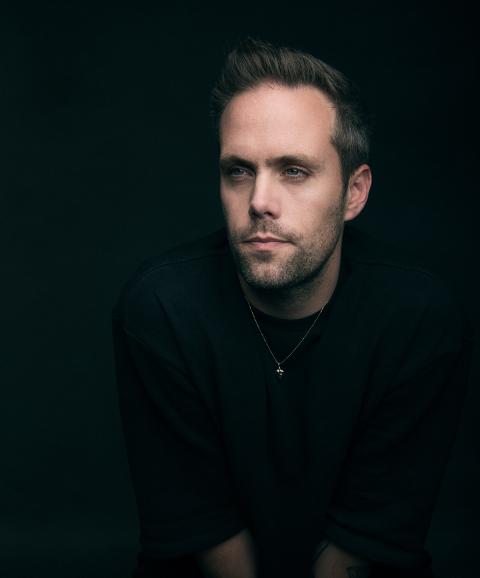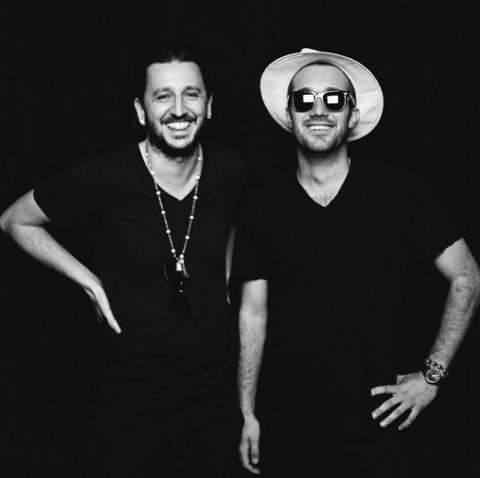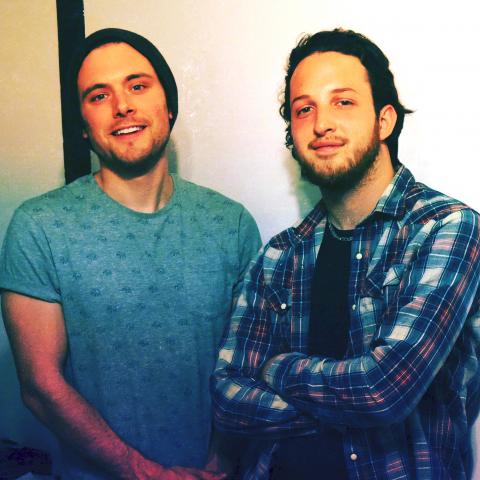Pop Hit Makers
For many, pop songs that are deeply embedded in our consciousness become part of the soundtrack of our lives. An unforgettable melody or a lyric that expresses exactly what we've felt has the power to flood our minds with impressions of a joyful moment long past, or to help us get through a rough patch in our lives. People all across the world feel the power of songs that make us want to dance, sing, or lean on them during hard times.
In our era, the pervasiveness of popular songs on terrestrial radio, TV, movies, social media, streaming services, and elsewhere, presents the phenomenon that more people are simultaneously having their own personal experiences with any given song. This is especially true for hit songs in today's single-dominated marketplace.
Past issues of Berklee Today have profiled numerous successful alumni tunesmiths who are part of the pop songwriting machine that produces the music top artists share with the world. What follows are the stories of a handful of young alumni songwriters in Los Angeles who are enjoying their day in the sun. Cowriting with producers, fellow songwriters, and major artists, they labor to create music that will hit listeners as truthful and authentic, and catchy enough to scale the charts.

Justin Tranter ’01
Luke Fontana
Reinvention
After bowing out of the spotlight as a lead singer for a behind-the-scenes role as a songwriter, Justin Tranter '01 has written many songs that have become fixtures on the Billboard Hot 100 charts. Over the past 18 months, Tranter cowrote a number of singles for—and often with—some of pop music's biggest names. His recent credits include “Sorry” (Justin Bieber), “Good for You” (Selena Gomez), “Centuries” (Fall Out Boy), “Nostalgic” (Kelly Clarkson), “Like Mariah” (Fifth Harmony), “Love Myself” (Hailee Steinfeld), and “Used to Love You” (Gwen Stefani), among others.
Tranter entered the business as the front man for the glam-punk band Semi Precious Weapons, formed in 2006 with fellow Berklee alumni Steve Pyne '02, Dan Crean '00, and Cole Whittle. The band's hard-edged music and Tranter's outrageous stage theatrics drew a following in New York clubs, and ultimately the band toured the world opening for Lady Gaga and Kesha and headlined its own gigs. The group recorded with three different labels, including Interscope Records, before landing at Epic Records. “We signed with Epic and worked on an album with Tricky Stewart and L.A. Reid, but the music never came out,” Tranter tells me across the kitchen table in his Los Angeles home. “The band was signed to Warner/Chappell for publishing, and when [A&R rep] Katie Vinten came in, she listened to our [unreleased] album, which leaned more toward pop than our others. She told me that if I was moving more toward pop, she could put me in sessions with other writers. She made this entire new life for me; I owe her everything.”
In January 2013, Tranter began doing writing sessions while working with his band. Kelly Clarkson was the first big artist to cut a song he'd cowritten, “Nostalgic.” “She cut it almost two years before it came out,” he says. “That was an early sign that writing was what I was supposed to be doing.” Successful sessions with other writers followed. By 2014, enough songs were getting cut that he decided to leave the band and focus solely on writing. “None of us were doing well financially,” Tranter recalls. “Quitting the band was a sky-opening moment for me. The next day Fall Out Boy announced that 'Centuries' was going to be their single. It went to no. 2 on iTunes immediately. It was a cool moment.”
A turning point for Tranter came in October 2014 when he first wrote with Julia Michaels. She is 13 years his junior and has been writing professionally since she was 16. “Right away we knew that there was a connection,” Tranter says. “The first song we wrote was cut by Rita Ora and Calvin Harris in London. Our third song was cut by Christina Aguilera. That's when we knew it was working. The ratio of cuts we were getting and the fun we had together was pretty impressive.”
The pair had a banner year in 2015 with a string of charting singles for a range of artists, including the aforementioned Bieber, Gomez, Steinfeld, and Stefani. They wrote extensively with Gomez and Stefani with five tracks appearing on Gomez's Revival album. Tranter and Michaels wrote 10 of the 12 tracks with Stefani for her This Is What the Truth Feels Like album, (Tranter and Jonathan Rotem '96 were cowriters on the remaining two tracks). Tranter has written about 25 songs to date with Stefani. Recently, Michaels and Tranter have been writing with John Legend and Britney Spears, among others.
When asked about his role in a songwriting session, Tranter says he does whatever is needed. “I do everything,” he says, “but if I rank things, I would put lyrics first and melody second. I play piano, so I write chord changes sometimes. I love the big picture and doing what an old-school producer would do: not making the beat, but digging into it and picking things apart. Every session is different. When working with Gwen Stefani, every syllable has to be what she is feeling right now. Sometimes we all get in a room and start talking and someone says something cool, and you know it's a song title. For 'Nostalgic,' all I had was a title, and we created a story.”
Tranter loves the path he's on as a hitmaker. “I'm using my Berklee degree [in songwriting] to the fullest,” he says. “Helping people figure out their vision and writing with Julia are so special that I'm going to do those things as long as I can. But I enjoy reinventing myself. I never meant to, things just happened. I was a solo songwriter, then I started a band, and now I'm a pop songwriter. I'd be excited about signing artists to a production deal and imprint. Slowly but surely, I want to start doing that. But whatever else appears that I'm passionate about, I'll chase it down. I can't wait for the next reinvention to present itself.”
From the Heart

Courtney Harrell '01
Songwriter and vocalist Courtney Harrell '01 came to Berklee as a teenager through the City Music program, and she was awarded a full scholarship to pursue a vocal performance major. “Since I was seven, Berklee was on my radar,” Harrell says. “I knew Quincy Jones had gone there, and I felt a pull to go there, too.”
Harrell grew up in Boston in a musical family. Her parents are pastors and musicians. “They're both amazing singers,” Harrell tells me over lunch at a sushi restaurant in California's San Fernando Valley, not far from her current home. “My dad has a voice kind of like Luther Vandross, and my mother is more like Patti LaBelle. My dad also writes. I guess I got that from him.” A broad musical palette and a gift for crafting solid lyrics and melodies has landed Harrell opportunities to work with top producers, songwriters, and artists in a range of musical styles.
“I love all genres,” she says. “I do R&B, urban music, contemporary gospel, and pop. I also took a stab at country music working with some great writers and producers in Nashville. Basically, I love to write whatever is truthful. As a black girl growing up in the '80s and '90s, my favorite music was soft rock. My dad exposed me to jazz, Broadway, and Motown songs, and my mother was all things gospel. I utilize all those parts of my background. If I have a goal, it's to maintain music on multiple charts. I have done that in pop, R&B, urban, jazz, and gospel.”
Harrell has worked on songs cut by Mary J. Blige, Ariana Grande, Chris Brown, Anastacia, Jennifer Hudson, Brandy, Nikki Yanofsky, and many others. Her collaborators have included John Legend, Makeba Riddick '99, Harmony Samuels, Rodney Jerkins, and the Stereotypes, to name a few.
Harrell's initial break came on the heels of what seemed a failed trip to New York, where she hoped to get her music heard. When she arrived, none of the people she wanted to meet with was there. “I was just walking around New York in the rain in three-inch stilettos,” Harrell recalls. A random encounter at a restaurant with a man who worked at ASCAP led to an invitation to return and meet with ASCAP's director of membership. “I went down there again a few days later and played him my demo,” she says. “Within 10 days I was working with people from all over the country.”
Writing sessions interspersed with tours as a background singer behind Tweet, JoJo, and John Legend, and opportunities to produce vocals in recording sessions followed. Career highlights have come with Harrell's work with British songwriter and producer Harmony Samuels. The first song they wrote together, “Think Like a Man,” came together very quickly—in just 20 minutes. It ended up in the soundtrack for the movie of the same name, sung by Jennifer Hudson and Ne-Yo, featuring Rick Ross. “Two weeks later, we were working with artists like Chris Brown, Mary J. Blige, Kelly Rowland, and Fantasia,” Harrell says. “These were people I admired and had wanted to work with. Almost everything I've written with Harmony has found a home.”
Other producers and songwriters with whom Harrell clicks include Rodney Jerkins, Dean Marshall, Rami Yacoub, A-Rod Lambert, and Jay Hart. She's traveled to Sweden, Atlanta, Nashville, and New York to collaborate, but unlike many pro songwriters, she doesn't pack her schedule with daily sessions.
“I feel you need to live a bit in order to have something to write about,” Harrell says. “I don't write every day, just once or twice a week. I like to come in strong. When people ask for me, they want something very specific. They know that they will get strong melody and lyrics—something worth listening to.”
Harrell particularly enjoys writing contemporary gospel music. Among other gospel titles, she cowrote “If We Had Your Eyes” with Samuels and Lambert for Michelle Williams. “It's a different side of songwriting when you are writing something sacred,” she says. “It's the purest form of writing I've ever done.”
Harrell is at her best when the songs truthfully reflect real life. Her songs come from “things I've lived in some fashion or seen happen to someone else,” she says. “For me to go from topics of love, good times, bad times, and then God, that's a lot of living, tears shed, and scars to prove the life that has been lived. Everyone understands what's coming from your heart and what's not.”
Writing success notwithstanding, the performing artist deep inside her remains. Harrell is currently planning her own album. “I'm a singer first, and am working on a project that I hope to release soon,” she says. “I wrote everything myself—it's a different side of me as a writer. The process of writing songs for myself was very different from writing for someone else—like night and day.”
The Right Direction

Julian Bunetta (left) and John Ryan
The songwriting and production team of Julian Bunetta '01 and John Ryan '10 has numerous credits together and separately, but the duo is best known for writing some 40 songs (often adding Jamie Scott to the mix), recorded by One Direction. Bunetta and Ryan cowrote hits such as “Best Song Ever,” “Story of My Life,” and “Drag Me Down,” among others that appeared on three multiplatinum-selling albums by the wildly successful British boy band.
Bunetta attended Berklee only briefly a decade before Ryan arrived. The summer after his first year, things opened up for him professionally when he met Judy Stakee, a publishing executive at Warner/Chappell. “Judy heard what I was doing and believed in me,” he says “At first, I was just producing demos for songwriters, but then it became a copublishing deal. From there I took it upon myself to learn the craft of songwriting.” Bunetta entered his personal songwriter boot camp in Nashville. “My first cut was a song I wrote with Wayne Kirkpatrick called 'Live with Lonesome' for Little Big Town,” Bunetta recalls. “In Nashville they really take the lyrics seriously, and I learned from Wayne and John Rich how to shape a lyric.” Bunetta's first pop cut, “Crash World,” a song cowritten with Desmond Child for Hilary Duff, followed.
A guitarist, Ryan majored in contemporary writing and production at Berklee. While visiting Los Angeles one summer, he met Bunetta at a party. “We were all playing Beach Boys and Beatles songs on the piano when I met Julian and his brother,” Ryan remembers. “We hit it off, exchanged numbers, and stayed in touch. I had two years left at Berklee at that point. I began sending them productions and getting critiques. After graduating, I decided to move to L.A. and go into business with them.”
Bunetta operates a publishing company with his father and brother, and they signed Ryan in 2010. During their first writing session, Bunetta and Ryan wrote a song that Ryan remembers well. “I hadn't been in the studio before with a real producer who recorded my voice properly,” he says. “To this day, I feel that song, 'Pretty Little Girl,' is rocking! It's unpublished, but it's a memory that shows the start of our adventure.”
After years in the trenches, Bunetta connected with a song he cowrote with singer Leona Lewis, the 2006 winner of Britain's X Factor show. Lewis was signed to Simon Cowell's Syco Music label. “Simon really believed in the song and invited me to his house to talk about the song and the production,” Bunetta says. “When he brought the X Factor to the U.S., I knew a lot of the people on his team, and they recommended that I become the show's music producer because I was stylistically diverse and could produce all kinds of music.
“The schedule was grueling,” Bunetta continues. “Over the course of 9 or 10 weeks, I did 50 full productions and mixes in various styles. The songs were all covers, but the challenge was to have a country artist prepare something for 'Motown Week' and have it work. Then you might have a 15-year-old R&B artist singing something for 'Billy Joel Week.' It required pulling apart some of the best songs ever written, shortening them [to fit TV time constraints], and putting them back together. That taught me how to aim for a target.”
After the show's first season, Cowell asked Bunetta to be the producer for his category the following season. As fate would have it, Tyler Brown, a member of Cowell's team, asked Bunetta to write a couple of songs for X Factor competitors One Direction. He suggested that Bunetta and Ryan work with British songwriter Jamie Scott on the project.
“We wrote some songs that got to Simon Cowell's label, and they liked them,” Ryan says. “We went to England to record them and hit it off with the band. The rest is history.” “There was this magic chemistry between us that you can't explain,” Bunetta says. “Everything we wrote worked for One Direction. Our first three songs were the first three singles for their Midnight Memories album.”
Ryan and Bunetta worked without pause on three One Direction albums beginning in 2013. “They were putting out an album a year,” Bunetta says. “So we had to be consistent and not take big breaks to stay in a rhythm together.” The band took a hiatus at the end of 2015, and Ryan and Bunetta have since been working together and apart on various projects. Ryan wrote the hook for the song “Fireball” by Pitbull and sang it on the recording. It showcases his voice and his flair for writing infectious melodies. After taking a well-deserved break at the beginning of 2016, Bunetta spent some time in London working with songwriters Ed Drewett and Wayne Hector.
Ryan and Bunetta are currently busy with various writing projects. Ryan is also penning songs for his own use. “If I go for being an artist,” he says, “I'll wait until I have a good collection of songs before I make that move.” Bunetta's future plans include writing as well as building his publishing company. “I want to sign talented people and help them achieve their goals,” he says. “I also want to continue exploring sounds and writing great songs that make people dance and sing along.”
Singing Their Own Stories

Ethan Thompson ’14 (left) and Pete Nappi ’13
Among the songwriters featured in this story, Pete Nappi '13 and Ethan Thompson '14 are the most recent arrivals to Los Angeles. After about two years here, they've made inroads. Nappi's forte is making beats and producing, in addition to playing multiple instruments. His primary collaborator, Thompson, possesses the quintessential male pop-music voice—sometimes high and soaring, sometimes breathy—and he also plays a few instruments. As a team, they bring a lot to the table collectively and have crafted and produced songs that have grabbed the attention of artists and label A&R reps.
“State of My Head,” cowritten by Nappi and Thompson with members of the rock band Shinedown (and produced for Shinedown by Nappi), topped Billboard magazine's Mainstream Rock chart earlier this year. In addition to writing with Thompson, Nappi has written with artists Kesha, Thirty Seconds to Mars, Meghan Trainor, Lindsey Stirling, and Will Sparks, among others.
Thompson, who was a contestant on American Idol Season 13 during his last year at Berklee, has cowritten and sung songs for DJs Ferry Corsten and Fareoh in addition to songs he's written with Nappi and various artists.
A common denominator in the educational and professional lives of both has been Kara DioGuardi. At Berklee, Nappi was a film scoring major and Thompson a songwriting major. Each was handpicked for DioGuardi's songwriting class. “Kara's class was the most influential one I took at Berklee,” Nappi says. “I had been focusing on film scoring and producing when I met her. She gave me direction and helped me realize what I needed to do.” Nappi is now among the writers in the stable of DioGuardi's production company, Arthouse Entertainment.
Thompson first encountered DioGuardi before he came to Berklee when he won a jingle contest for Folgers Coffee, and DioGuardi was a judge. Interestingly, other successful alumni, including Charlie Puth '13; Jessica Newham '13 (better known as Betty Who), Laney Jones '14, and Sarah Walk '13 were also among DioGuardi's students. “When the class started, Kara told us we'd need to write one song a week,” Thompson recalls. “Back then we thought that was the hardest thing ever! Now out here, you have to write one or even two songs each day.”
Nappi had been working in Los Angeles before Thompson arrived. New to town, Thompson called DioGuardi, who recommended that he connect with Nappi. In North Hollywood, at Nappi's home studio, they played me a handful of the songs they've been working on. The tunes run the gamut from straight-up pop to rock to acoustic to EDM. The duo takes various approaches in writing sessions. “The other day, I started with a track,” Nappi says. “I put together some chords and Ethan had vocal ideas and we built it from there.”
“Some days I want to work with a track, and other days I want to hear a live instrument,” Thompson notes. “Often, I like to start by playing an instrument, something that's real. The best songs for me are the ones that are real and have some raw emotion. I get those emotions playing guitar or piano. Other times, Pete makes a track that I immediately want to sing to.”
The two have written more than 50 songs together, and strive to put their best out. They are aware that there are many factors that affect how a new song is received. “We go to different A&R people, and one will flip out over the song another doesn't react to,” Thompson says. “There is a lot of personal opinion involved.” “You can't get your hopes up too high,” adds Nappi. “Even if an artist likes your song and says he will use it, a lot of times it doesn't happen.”
With singles being the coin of the realm today, labels and artists are looking for hits more than ever. “These days, if you don't write a hit single, you're just not going to make that much money,” says Thompson. “One sad aspect about songwriting is that some good ones that don't get used end up just sitting in iTunes on your laptop,” says Nappi.
This team has found a remedy for that problem. “My publisher at Universal set up a meeting with [British singer-songwriter and DJ] Sam Ronson and me,” Nappi says. “I invited Ethan to come to the session.” The three have formed a band and will make a record soon.”
Hollywood Records, the Disney imprint, signed their group, Ocean Park Standoff, to a recording and publishing deal, and holds out the promise for sync deals for the songs on Nappi's laptop that others have passed on. While Nappi and Thompson continue to write singles for artists, the band has expanded their vision for their careers, adding plans for touring to the mix.
“The end goal [now] is to be making our own music and performing it,” Nappi says. “I want to be a good songwriter, be good in the band, and produce for other people,” Thompson says. “I started songwriting so that I could sing my own stories.”
